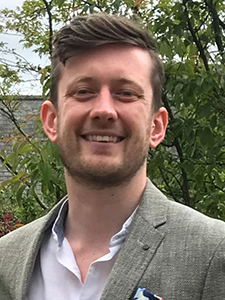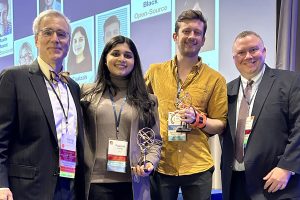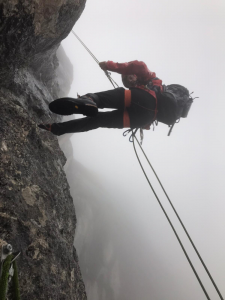- Who We Are
- Updates & News
- Standards
- Software Tools
- Network Studies
- Community Forums
- Education
- New To OHDSI?
- Community Calls
- Past Events
- 2024 Europe Symposium
- 2024 Thailand Tutorial
- 2024 Japan Tutorial
- 2024 DevCon
- 2024 Phenotype Phebruary
- 2023 Global Symposium
- 2023 APAC Symposium
- 2023 Europe Symposium
- 2023 SOS Challenge
- 2023 DevCon
- 2023 Phenotype Phebruary
- 2022 Global Symposium
- 2021 Global Symposium
- 2020 Global Symposium
- ALL Past OHDSI Events
- Workgroups
- 2023 ‘Our Journey’ Annual Report
- This Week In OHDSI
- Support & Sponsorship
- CBER Best Seminars
- 2024 Europe Symposium
- 2024 Global Symposium
- Github
- YouTube
- Newsletters
Collaborator Spotlight: Ross Williams
Ross Williams is a scientific researcher working in the group of Dr. Peter Rijnbeek at Erasmus MC, where he is part of the Health Data Science group. His main focus is creating tools and analysis methods to develop personalised medical risk prediction. His specific areas of interest are on the external validation of prediction models, net benefit assessment and techniques for temporal health data analysis. He co-leads both the Patient Level Prediction workgroup and the Early-Stage Researcher workgroup.
A 2021 Titan Award honoree, Ross obtained his PhD at Erasmus University Medical Center (2023) and his MSc (2017) in Data Science from King’s College London. He previously obtained his BSc in Physics and Philosophy from the same institution. Before starting work at Erasmus MC he spent time working on a Marie Curie scholarship on the TRANSACT project under the EU FP7 initiative.
Ross discusses his career journey, how observational data impacts prediction models, the opportunities for junior researchers in OHDSI, and plenty more in the latest edition of the Collaborator Spotlight.

Can you discuss your career journey and your major research focuses?
My career started by studying Physics and Philosophy as an undergraduate. This in a roundabout way led to an interest in machine learning and specifically machine learning for healthcare. Following my BSc I spent a year working in Brno, Czech Republic, doing NMR spectroscopy. Whilst there I first encountered the use of machine learning in healthcare. That focused on using either image or spectral data for outcome prediction. This lead to doing an MSc in Data Science during which I created several prediction models based on clinical trial data. A major pain of this was the lack of interoperability, which even in this small data environment took up the majority of my time.
A desire to continue developing prediction models but not having to worry (as much) about interoperability led me to the team led by Prof. Peter Rijnbeek at Erasmus MC. 6 years and a PhD later I am still at EMC, where I am currently an assistant professor. My major research focuses are the development and validation of prediction models using observational data. I am currently developing my own research team with 2 PhDs (shared with Jenna Reps). This research line will focus on the implementation of prediction models. One of my current focuses is the establishment of an AI expertise Centre at EMC, which will have responsibility for the management and assessment of prediction models, machine learning and AI within clinical and business operations at the hospital. Alongside this I am leading the software development team at the Medical Informatics department with major responsibilities within the DARWIN-EU project.
You were part of the Erasmus team that helped lead the virtual COVID-19 study-a-thon. What are your memories from that event, and what did you learn most about leading a global network study?
One of the major memories I have from this event is the strong sense of community, which was something undoubtedly important during a busy and stressful period. A strong abiding memory of this was the leadership displayed by major OHDSI figures, but also the accessibility of these figures and their willingness to trust and delegate tasks to more junior researchers. A nice thing about OHDSI is the speed you can move from novice to intermediate and how people provide you with trust to perform analysis but also support you in doing so. You’re never left on an island, there is always a boat and someone willing to sail with you.

Ross Williams (second from right) earned a 2021 Titan Award for Community Support as co-lead of the Early-Stage Researchers workgroup.
You and Jenna Reps led the OHDSI Prediction Workgroup. Can you discuss how observational data can empower predicative models for patients, and maybe provide an example of this?
Observational data can and will play a key role in the development of prediction models that impact patient care. Quoting from my own thesis “At the heart of medicine, lies decision making. Every day clinicians face the complex challenge of making decisions about a patient’s treatments.” Many of these decisions are tied to risk considerations. Is my patient at risk of a side effect? Am I worried about them developing a specific complication? Are any of these elevated by the drugs I am considering? In a perfect world we would have a prediction model for each of these questions and this would allow us to make better informed decisions for each patient. The only source of data that has a chance of building models on this scale is observational data.
I think my favourite example of this at the moment comes from the Center of Surgical Science based in Denmark. I helped them in the development of a prediction model using their own OMOP CDM observational data (see this presentation for OHDSI Europe). Here they have developed, validated and implemented a prediction model into the routine care that they give patients. This is the first example I know that uses the OHDSI toolstack and takes a model really into the clinic. I cannot wait to see how this develops further!
You completed your PhD at Erasmus MC last year (congratulations!). Can you discuss how both OHDSI tools and the community impacted your research?
Simply put, my PhD would have been impossible without the OHDSI toolstack and the community. The major focus of my PhD is the external validation of prediction models. This requires a very high level of data and analytical tool interoperability. The two clinical papers I included had multiple databases, multiple models, and multiple clinical ideas involved in it. These were all externally validated in multiple databases. The methods work focused on using the federated network of databases to improve model development and validation. In order to do this work I needed to rely on the ETL associated packages, DQD, and then on the analytic side DatabaseConnector, FeatureExtraction, SQLRender, CohortGenerator, ATLAS, CohortMethod, Cyclops and of course PatientLevelPrediction.
The community was first and foremost inspiring. The weekly Tuesday calls were always a source of thought provoking ideas and a good insight into the wider world of RWE and helped me form my own ideas on how we can build better prediction tools, how they fit into current processes. The second thing is how welcoming the community is to newbies. At the symposiums and the working group meetings you’re welcomed and questioned and people show interest in your work. You also almost always find a collaborator on any project that you work on, someone will find it interesting, someone will have data and almost always their first thought is how do we build this together. This openness means I always felt able to float any ideas I had, and more often than not someone else wanted to run with me together on this.
You are one of numerous examples of junior researchers who have been leading critical work in the community. What would you say to other junior researchers who may feel like OHDSI is too big for them to make an impact?
Put your hand up and say you want to do something. One thing I have learned is that there are too many ideas and not enough time. Within OHDSI you will quickly see how willing people are to support you in a topic they find interesting. Often people do not have the time to drive a certain topic forward, but they do have the time to support, advise and every so often lend a bit more time. I think back to the Oxford Knee replacement studyathon and I would attribute a reasonable portion of my current success to putting my hand up and offering to write the prediction paper, despite having at that point minimal prediction modelling experience, no epidemiology experience and having not written a scientific paper. Having agreed to drive this forward several members of the OHDSI senior leadership spent time helping me (thanks Patrick, Dani and others) despite not having a direct supervisory relationship to me.
Building off that, you and Faaizah Arshad started the Early-Stage Researchers Workgroup, and you have led several Meet the Mentors sessions. How valuable is it to connect with both peers at the same point in their careers, but also veterans who can provide mentorship advice?
I think the opportunity to connect to peers is something very important and something we really wanted to help and facilitate through the ESR WG. If I specifically think about my own PhD journey, it is not a smooth journey from start to finish. During both the ups and downs its incredibly helpful and valuable to be able to chat with peers who are at a similar stage. Its also nice to start to feel ownership of projects and to be able to collaborate, and here again having the contacts with peers is essential. I think particularly when you’re developing your own scientific voice, it’s helpful to have these discussions and to develop these ideas and your own confidence in them.
One of the most fun things I get to do is to organize the Meet the Mentors sessions at the European and Global symposiums. These are events where we organize short, stand-up meetings between junior researchers and senior faculty. This, I hope, enables people who are new to OHDSI, who are maybe not from groups with long-term OHDSI relationships, to have discussions with the most prominent OHDSI figures. We try to make sure that these cover a broad range of topics and from analytics to software to data and databasing. I think its also a nice moment to invite people who maybe do not recognize themselves how senior they have become and so its always a nice experience to get to invite new people to be mentors every time!
What are some of your hobbies, and what is one interesting thing that most community members might not know about you?
I spend most of my time outside of work thinking about or if I am lucky, climbing mountains. I am usually never more relaxed than when on the sharp end of an alpine tour. Likely what most members won’t know about me is that abseiling bores me and I really dislike it (photo related) and if I could avoid it I always would. If you’re thinking of inviting me for some mountain activity, just be sure its focused on going up and not down!

